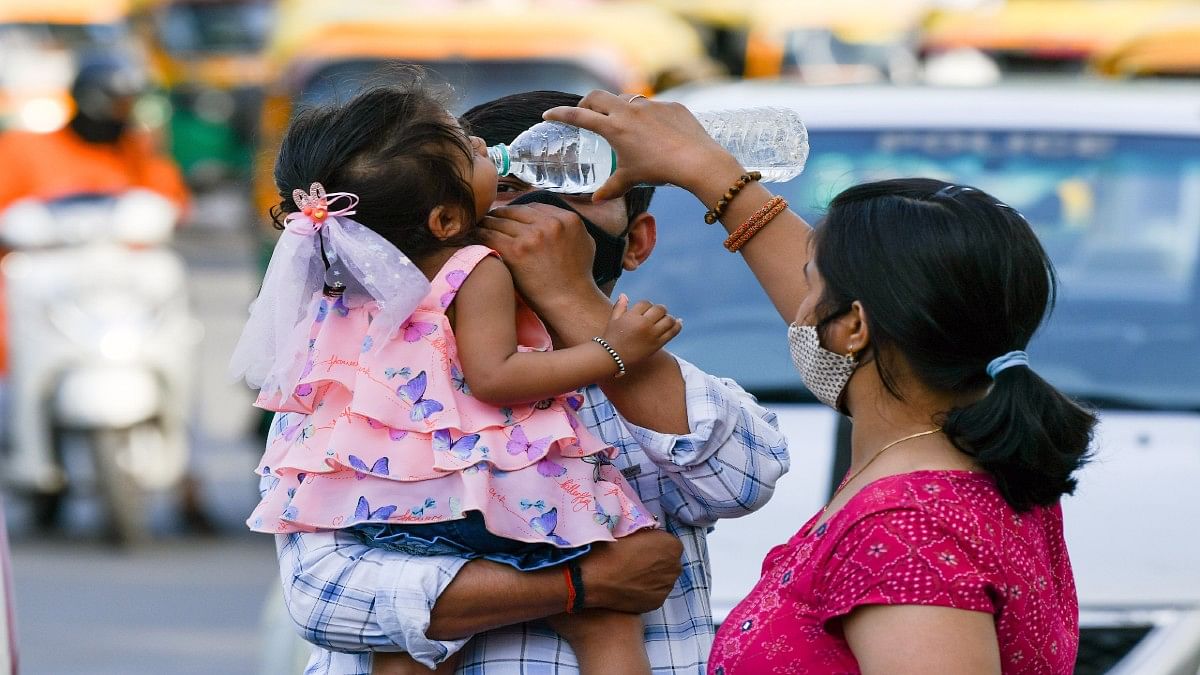News
Millions Suffer from Heat Stroke as Global Heat Wave Continues

Heatstroke affected millions of people on three different continents as fires burned, health concerns grow, as appeared that July will go down in history as the hottest month ever. Experts blamed the combustion of fossil fuels for climate change, saying it was a major factor in the disastrous weather as temperature records fell on three continents.
Governments and the World Health Organisation issued alerts as the population’s most vulnerable segments suffered.
Greek people had to decide whether to leave from two forest fires that were blazing to the west of Athens and on the tourist island of Rhodes.
“I’m staying here. As a resident of the town of Pournari, which is in danger of burning down, Dimitris Michaelous remarked, “I started building this house when I was 27 years old by myself.
According to the firefighters in Greece, 230 firefighters from Romania, Slovakia, and Poland will assist in putting out the fires.
Polish fire services report, 49 cars carrying 149 firefighters were travelling 1,250 miles (2,000 kilometres) to Greece.
In the south of the country, particularly on the Mediterranean vacation island Corsica, temperatures reached up to 40 degrees Celsius (104 degrees Fahrenheit).
Beijing surpassed a 23-year-old record by experiencing temperatures above 35 degrees for 27 straight days. Student Qiu Yichong, 22, stated, “At noon, it feels like the sun is roasting my legs and my skin is burning.”
Reuters quoted deliveryman Han Weili as saying: “Sometimes when it is very hot, I feel a little confused or dizzy.”
To lessen exposure to the heat and ground-level ozone pollution, the Beijing administration urged those in their golden years to stay inside and advised kids to limit their outside playtime. People were turning up their air conditioning, which increased the demand for energy.
According to the World Health Organisation, the intense heat is taxing healthcare services and harming children, newborns, and the elderly. The WHO stated that persons with diabetes, asthma, and cardiovascular illnesses are of special concern.
400 firemen battled a blaze in the Canary Islands that destroyed 3,500 hectares of forest and forced 4,000 families to leave their homes. The government issued a warning to the public to wear face masks outside due to the poor air quality.
Three regions of Spain were on red alert due to the extreme temperatures throughout the country.
The national weather agency reported on Wednesday that coastal waters around Spain have reached a temperature that is exceptionally high for this time of year.
It has been predicted that the islands of Sardinia and Sicily may break the continental record of 48.8C set in Sicily in August 2021.
A summer camp for kids in Lanusei, close to Sardinia’s eastern coast, has banned sports and only allows beach trips in the early morning, according to teacher Morgana Cucca.
Many people in Italy, even those outside of Rome where the temperature reached 40C, sought refuge by the Mediterranean. At the Focene beach close to the capital, Virginia Cesario, 30, said, “You can at least receive a little wind from the water.
A 26-year-old Belgian office worker named Fabrizio Carozza stated, “This has become the new normal.”
After experiencing deadly heat the day before, tens of millions of people in North America woke up to another scorcher on Wednesday.
run out of options
The National Weather Service acknowledged that it was “running out of ways to say that it’s going to be hot out there today” in the Texas town of San Angelo, where temperatures were forecast to reach 108F (42C).
The organisation posted on Twitter, “We implore you to continue to practise heat safety.”
The previous record of 18 straight days at or above that temperature, set in 1974, was shattered on Tuesday at Phoenix Sky Harbour Airport in Arizona, where the temperature once more surpassed 110F.
Even Iraq, where July temperatures typically hover around 32°C, struggled to keep up with the heat wave, forcing the mayor of Basrah in the south to offer civil staff Thursday off when temperatures of 50°C or more are predicted.
The European Union’s climate observatory informed AFP on Wednesday that the world is on track to see the warmest July ever recorded.
Carlo Buontempo, director of the Copernicus Climate Change Service (C3S), stated that the first 15 days of July were the warmest 15 days on record.
According to Robert Vautard, director of France’s Pierre-Simon Laplace climate centre, the heat waves that are sweeping through Europe and the world are “not one single phenomenon but several acting at the same time.”
But one thing makes them all stronger: climate change.
Heat Stroke
Heat stroke is a severe and potentially life-threatening medical condition that occurs when the body’s temperature regulation system fails to cope with excessive heat. It is considered a medical emergency and requires immediate attention.
Heat stroke typically develops when the body is exposed to high temperatures and humidity for an extended period, especially during heatwaves or in hot and humid environments. It can affect anyone, but certain groups are more vulnerable, including the elderly, young children, people with chronic illnesses, and those who engage in strenuous physical activities in hot conditions.
The main causes of heat stroke include:
1. Prolonged exposure to high temperatures: Staying in an excessively hot environment for an extended period without proper cooling or hydration can lead to heat stroke.
2. Dehydration: Not drinking enough fluids, especially in hot conditions or during physical activity, can impair the body’s ability to cool itself down through sweating.
3. Overexertion: Engaging in intense physical activities in hot weather can increase the risk of heat stroke, particularly if adequate breaks and hydration are not provided.
Symptoms of heat stroke can vary, but they often include:
– Extremely high body temperature (often exceeding 40°C or 104°F)
– Confusion or disorientation
– Rapid and shallow breathing
– Rapid and strong pulse
– Headache
– Nausea and vomiting
– Lack of sweating, despite the heat
– Red, hot, and dry skin
– Fainting or loss of consciousness
If you suspect someone is experiencing heat stroke, it is crucial to take immediate action:
1. Move the person to a cooler and shaded area.
2. Call emergency services for medical help.
3. Remove excess clothing to help cool the person down.
4. Apply cool, wet cloths to their skin or use a fan to promote cooling.
5. Encourage the person to drink small sips of water if they are conscious and able to swallow.
Avoid giving the person anything icy cold to drink as it may cause shock. Do not leave the person unattended, and continue to monitor their condition until medical help arrives.
Preventing heat stroke involves staying hydrated, avoiding prolonged exposure to high temperatures, wearing lightweight and breathable clothing, taking frequent breaks in the shade, and refraining from engaging in strenuous activities during the hottest parts of the day.
































